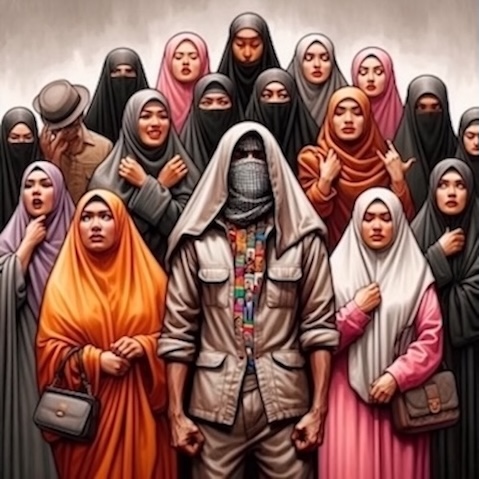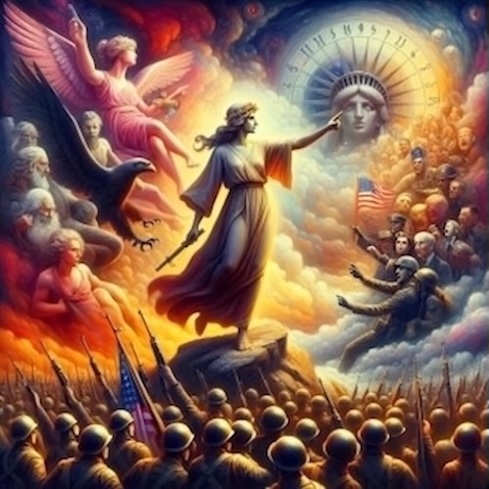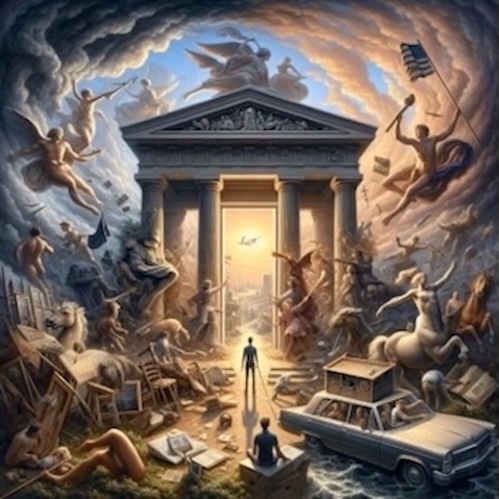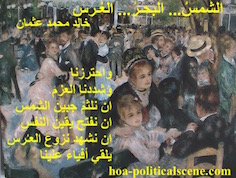How Established Opinions Shape Perception?
How Established Opinions Shape Perception may raise your hair!... Just kidding - denoting the fact that they do in real life. Throughout centuries, established contextual narratives have played a profound role in shaping public opinion. These narratives, often rooted in tradition, authority, or dominant ideologies, influence how societies interpret reality, accept norms, and engage with change. The results vary... some narratives subject the public to rigid, unquestionable frameworks, while others seek compliance through gradual conditioning, requiring individuals to internalize and adhere to prevailing perspectives.
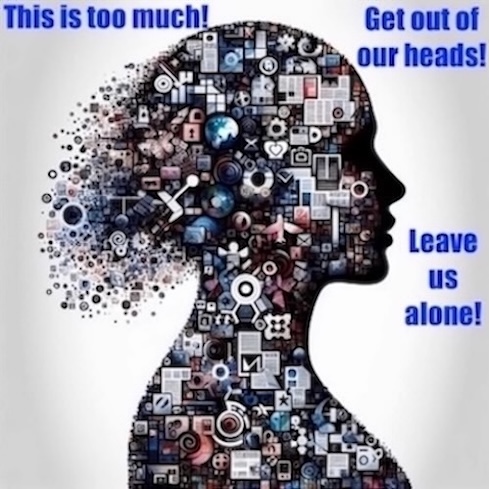 How Established Opinions Shape Perception: An artwork portraying a fractured human figure, molded by societal expectations and deeply enmeshed in the digital world of social media and online platforms. These influences shape personal structure, pushing individuals toward conformity, often at the cost of privacy, a right many overlook.
How Established Opinions Shape Perception: An artwork portraying a fractured human figure, molded by societal expectations and deeply enmeshed in the digital world of social media and online platforms. These influences shape personal structure, pushing individuals toward conformity, often at the cost of privacy, a right many overlook.In many cases, these established opinions become self-reinforcing, passed down through generations and embedded within educational systems, media, and governance structures. When a society is conditioned to accept certain viewpoints as absolute truths, critical thinking is often suppressed, making it difficult for individuals to challenge or redefine their understanding of the world. This phenomenon is particularly evident in political discourse, where long-standing ideologies shape national identity, policy decisions, and collective behavior.
Moreover, the psychological impact of established opinions extends beyond mere acceptance... it influences decision-making, resistance to change, and societal progress. People often fear deviating from dominant narratives due to social consequences, institutional pressures, or personal insecurities. However, history has shown that transformative shifts occur when individuals and movements challenge these entrenched perspectives, paving the way for new interpretations, progressive reforms, and intellectual evolution.
This is one of the most impactful issues that stop rethinking of serious issues in our livee and forbidder progress. Therefore, it is connected with other issues on 5-8 pages, which are also interconnected with other 20 pages on this network Here are some of the intertwined pages, which you can read at the sections of the Global Dynamics at the end of the page, including this one:.
- Why Expanding Horn Africa to Include Other States and Global Impacts?
- A New Era of Chaos and Distrust is Shaping!
- Pre-Cold War Era of Colonialism & Imperial Rivalries!
- Pre-Cold War American Expansionism!
- The Cold War Era: A Battle of Ideologies and Influence!
- Why Do Nations Fragment When Unity is Their Greatest Strength?
- Eastern Europe Socialist Bloc Fragmentation!
- Sudan and U.S. Policy: A Terrorism Connection? What's The Real Story?
- Eritrea Was Too Late to Independence Due to Colonial Conspiracies!
- Namibian Road to Independence From Liberation to Sovereignty!
- The Post-Cold War Era: A Shifting Global Landscape!
- How Economics, Ideology, and Geopolitics Fragment Nations and Create New Ones?
- New World Order: Stability or Chaos?
- Why Am I Saying A New Era of Disorder and Doubts is Shaping?
- Rewriting History: The Lies We Inherit!
- Illusion of Institutional Narratives!
- Why Prevailing Perspectives Fail Us?
- Conventional Narratives Are Always Wrong!
- Rewriting History: The Lies We Inherit!
- How Established Opinions Shape Perception?
Distorted Realities: How Established Opinions Shape Perception?
Throughout history, deeply ingrained beliefs have shaped how societies interpret events, define success, and reinforce biases. While some narratives provide structure and identity, others distort prevailing perspectives, preventing critical thinking and shaping beliefs in ways that hinder progress. Here are additional ways conventional opinions distort reality and mislead public understanding:
1. The Meritocracy Illusion
Many societies promote the idea that talent and effort alone determine success. While hard work matters, this narrative ignores systemic advantages such as nepotism... economic inequality, access to elite education, and inherited wealth. By focusing solely on individual effort, it downplays structural inequalities, making it harder to address unfair advantages.
2. Historical Events and National Myths
Conventional narratives frequently glorify a nation’s past while downplaying uncomfortable truths. For example, some historical accounts present colonialism as a "civilizing mission", ignoring exploitation and violence. These distortions shape collective memory, making it difficult to confront past injustices and foster reconciliation.
3. Sanitized War Narratives
History often portrays wars as necessary struggles for freedom, while minimizing civilian casualties, economic devastation, and long-term consequences. For example, some accounts glorify military interventions while ignoring the suffering of displaced populations. These distortions shape national identity, making it difficult to acknowledge historical mistakes.
4. Gender Stereotypes
Societies have long reinforced rigid gender roles, such as “men are natural leaders” or "women are naturally nurturing." These ideas shape expectations and create biases that distort reality, leading to discrimination in workplaces, leadership roles, and education. Challenging these narratives is essential for equity and inclusion.
5. The "Natural Order" Myth in Social Hierarchies
Societies have long justified inequality by claiming that certain groups are naturally suited for leadership or subservience. This belief has been used to justify class divisions, racial discrimination, and gender inequality. By presenting hierarchy as inevitable, it discourages efforts to create more equitable systems.
6. The "Innovation Equals Progress" Assumption
While technological advancements bring benefits, the idea that all innovation is inherently good distorts discussions on its ethical consequences. For example, AI and automation improve efficiency but also eliminate jobs and deepen economic disparities. While innovations bring benefits, they also raise concerns about privacy, environmental harm, and social inequality. The conventional narrative of "technology as progress" and "progress at any cost" often prevents deeper conversations about responsible development and innovation.
7. Media-Driven Fear Narratives, Media Influence and Public Perception
News and entertainment often sensationalize threats and frequently reinforce simplified narratives, shaping public perception through "fear-based narratives". For example, crime reporting may disproportionately focus on certain communities, reinforcing and fueling stereotypes, influencing policy decisions and distorting perceptions. Similarly, political discourse often frames opponents as existential threats and other complex issues in misleading ways, distorting rational debate and influencing how people vote and engage with policy.
By critically examining established opinions, societies can challenge and break free from distorted perspectives, uncover deeper truths and foster critical thinking and informed decision-making.
The Meritocracy Illusion: How Misconceptions Shape History and What We Can Do About It?
Explores how the idea of meritocracy... where success is supposedly based on talent and effort often masks deeper systemic inequalities.
Meritocracy, the belief that individuals succeed based solely on their talent and hard work has long been a cornerstone of modern societies. It promises fairness, rewarding those who strive the hardest. But beneath this appealing narrative lies a troubling illusion: meritocracy often ignores structural inequalities, historical biases, and the role of privilege in shaping outcomes.
The Misconception of Meritocracy
At its core, meritocracy assumes a level playing field. It suggests that everyone starts from the same position and that success is purely a result of personal effort. However, this ignores key factors such as:
- Inherited Privilege: Wealth, education, and social connections often give certain individuals a head start.
- Systemic Barriers: Discrimination based on race, gender, class, or disability can limit opportunities.
- Unequal Access to Resources: Quality education, healthcare, and mentorship are not distributed equally.
This misconception leads to the dangerous belief that those who fail simply didn’t work hard enough, rather than acknowledging the systemic obstacles they faced.
The Historical Roots of the Illusion
The idea of meritocracy has deep historical roots. In the 19th century, industrialized nations promoted the notion that anyone could rise through the ranks with hard work. However, this was often a convenient myth used to justify existing hierarchies.
- The Gilded Age (late 19th century): While self-made millionaires were celebrated, wealth was largely concentrated among those who inherited it.
- Post-WWII Boom: The rise of middle-class prosperity in Western nations reinforced the idea that effort alone led to success, ignoring the role of government policies and economic conditions.
- Modern Corporate Culture: Today, companies claim to reward merit, yet hiring biases, nepotism, and unequal access to elite education persist.
Throughout history, meritocracy has been used to justify inequality rather than dismantle it.
What Can Be Done?
Recognizing the illusion of meritocracy is the first step toward creating a fairer society. Here’s what can help:
- Acknowledge Structural Inequalities: Accept that success is influenced by factors beyond individual effort.
- Reform Education and Hiring Practices: Ensure equal access to quality education and implement unbiased hiring policies.
- Support Policies That Level the Playing Field: Advocate for social programs that provide opportunities for disadvantaged groups.
- Challenge the Narrative: Encourage discussions that expose the flaws in meritocratic thinking.
Meritocracy should be an aspiration, not an illusion. By addressing its misconceptions, we can move toward a society where success is truly based on ability and effort not privilege.
Historical Events and National Myths: How Nations Shape Their Own Stories?
Every nation has a story... a grand narrative that defines its identity, values, and place in history. These stories are often built around key historical events, but they are rarely objective. Instead, they are shaped by national myths, simplified, glorified, or even distorted versions of history that serve a purpose beyond mere facts.
The Power of National Myths
National myths are more than just tales of heroism or triumph; they are tools used to unify people, justify policies, and reinforce cultural identity. They often emerge from historical events but are carefully curated to serve a particular vision of the nation.
Some common features of national myths include:
- Selective Memory: Certain aspects of history are emphasized while others are ignored.
- Moral Clarity: Events are framed in black-and-white terms, with clear heroes and villains.
- Symbolic Figures: Leaders or revolutionaries are elevated to near-mythical status.
- National Exceptionalism: The idea that a nation is uniquely virtuous or destined for greatness.
These myths are not necessarily false, but they are rarely the full truth.
Examples of National Myths in History
Throughout history, nations have crafted myths around pivotal events to shape their identity. Here are a few examples:
- The American Revolution: Often portrayed as a pure struggle for freedom, the complexities of economic interests, internal divisions, and the role of Indigenous peoples are often overlooked.
- The French Revolution: Celebrated as the birth of democracy, but its violent excesses and political instability are downplayed in favor of its ideals.
- The Fall of the Berlin Wall: Seen as a moment of liberation, yet the economic and social struggles of reunification are less discussed.
Each of these events is real, but the way they are remembered serves a national purpose.
Why National Myths Matter?
National myths shape how citizens view their country and its role in the world. They influence education, politics, and even foreign relations. While they can foster unity and pride, they can also lead to:
- Historical Blind Spots: Ignoring uncomfortable truths about colonialism, oppression, or injustice.
- Resistance to Change: Myths can make it harder to acknowledge past mistakes and evolve as a society.
- Conflict with Other Nations: Competing national myths can fuel tensions between countries.
Moving Toward a More Honest History
While national myths will always exist, societies can strive for a more balanced understanding of history by:
- Encouraging Critical Thinking: Teaching history as a complex, evolving narrative rather than a fixed story.
- Including Diverse Perspectives: Recognizing the voices of marginalized groups often left out of national myths.
- Separating Patriotism from Mythology: Loving one’s country does not require ignoring its flaws.
History is not just a collection of facts... it is a living conversation about the past. By questioning national myths, we can build a more honest and inclusive future.
These insights don't end here. They continue on some other pages. Be sure to read them at the Global Dynamics Sections, Just below your eyes... See you there.
The Global Dynamics Offer Solutions to World Crises & Enhance Perception!
Through the International Dynamics you explore the world crises and get solutions in addition to the enhancement of how you perceive everything that goes wrong in the world since 1989.
How Established Opinions Shape Perception?: Are We Repeating Colonial Mistakes in Space? [Latest on The Insight Lens: Thursday, May 08, 2025] Support me here Incredible videosHow Established Opinions Shape Perception?: From Colonial Empires to Space Frontiers: Lessons Unlearned [Latest on The Insight Lens: May 9, 2025] Support me here Follow the Insight Lens
How Established Opinions Shape Perception?: The Hidden Dangers of Space Exploration: Are We Going Too Far? [Latest on The Insight Lens: May 10, 2025]
How Established Opinions Shape Perception?: Space Exploration: Worth the Risk or Too Costly? [Latest on The Insight Lens: May 10, 2025]
How Established Opinions Shape Perception?: Exploring the Unknown: Life, Environment & Cybersecurity! [Latest on The Insight Lens: May 06, 2025]
How Established Opinions Shape Perception?: Robot Debate: Science & Innovation Breakthroughs! [Latest on The Insight Lens: Monday, May 05, 2025]
How Established Opinions Shape Perception?: Navigating Global Chaos: Leadership in Trade Wars and Diplomacy! [Latest on The Insight Lens: 2025-04-22]
How Established Opinions Shape Perception?: Navigating Trade Wars: China's Grip on Wellness Products! [Latest on The Insight Lens: 2025-04-22]
How Established Opinions Shape Perception?: Climate Change: Myths vs. Reality! [Latest on The Insight Lens: Monday, May 05, 2025]
How Established Opinions Shape Perception?: The World is Heating Amid Trade Wars – A Crisis Ignored! [Latest on The Insight Lens: 2025-04-24]
How Established Opinions Shape Perception?: How Trump’s Tariffs Led to Price Hikes & Consumer Resistance? [The Insight Lens]
How Established Opinions Shape Perception?: Robot Anchor Reports: Trade War Tensions & Market Reactions! [Latest on The Insight Lens: 2025-04-23]
How Established Opinions Shape Perception?: Robot Anchor Reports: U.S. Trade War & Gold Surge! [Latest on The Insight Lens: 2025-04-22]
What Do You Think of "How Established Opinions Shape Perception"?
Let me know what you think of "How Established Opinions Shape Perception". Your opinions will open rational discussions in such topic.
Have A Great Story About This Topic?
Do you have a great story about this? Share it!
Did you get any of my books from Apple Books?
Click here to tell me & get some free books. Fill the form.
رواية "الموتُ شرقاً" تكشف لك سرّ الموت الشرقي التراجيدي المستمر للإنسان
احصل علي الرواية الآن واكتشف إنهيار القواسم المشتركة، واستلهم إبداعا يشبه الأسطورة في النص الروائي
"Follow", "like", "tweet", or "pin" the pictures to express your love! Thanks
TweetHorn Africa's Political Tragedy
Love in the Internet Time on Apple Books
Rising of the Phoenix Poetry on Apple Books
Free Poetry Picture Book
Free poetry picture book on Apple Books. You can use the images on public places for your customers to enjoy, while taking coffee.
The French & Spanish Versions
You can work the French versions and the Spanish versions of the two books above with me on, one on one bases. Contact Us.
HOAs Political Poetry Imaged
I'll be thankful, if you get one of my books.
My Books!
Publish Your BookLet's be the publishers of your book. Use the form at Contact Us.

